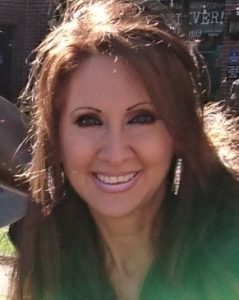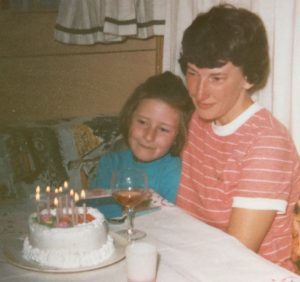Jen Gilroy's Blog, page 22
December 1, 2016
Meet me at the diner: Debut author Arlene McFarlane
With this post, I’m launching a new, occasional series on my blog featuring interviews with author friends about their new releases. I’ve called it “meet me at the diner” because in the small communities I write about, diners are gathering places with a special, hometown feel.
My first guest is Arlene McFarlane, whose debut release, Murder, Curlers, and Cream, a cozy mystery with a helping of romance, came out in November 2016.
Arlene is a two-time Romance Writers of America® (RWA®) Golden Heart® finalist, and amongst many other contest wins and finals, has also been nominated twice for the prestigious Daphne du Maurier Award for Excellence in Mystery/Suspense.
I met Arlene in 2015 when I also was a Golden Heart® finalist, and she lives with her family in southwestern Ontario so we share Canadian roots, too.
Murder, Curlers, and Cream is set in a beauty salon and the heroine, Valentine Beaumont, is a feisty beautician who is determined to keep her struggling business afloat. She has a meddling mother, a quirky staff and, when the story starts, a dead client. Sexy Detective Romero is assigned to the case and, as the story unfolds and more mayhem ensues, sparks fly between he and Valentine.
Since I’m among friends, I have to confess that I have a complicated relationship with the beauty industry. After a cut that left me with hair of different lengths on each side of my head, highlights that turned my naturally brown hair orange, and a facial that gave me an itchy rash, I approach beauticians with caution.
However, the fictional Valentine is a heroine everyone can root for. She cares about people and, behind her glamorous façade, she has a touching vulnerability. And although it’s a murder mystery, it’s also a very funny book—as I discovered when I started reading it after English Rose had gone to bed and laughed so loudly I woke her up.
 It’s a pleasure to have Arlene join me today. Slide into a booth, grab a mug of your favourite brew and piece of homemade pie, and let’s chat with her.
It’s a pleasure to have Arlene join me today. Slide into a booth, grab a mug of your favourite brew and piece of homemade pie, and let’s chat with her.
Before you became a writer, you worked in the beauty industry and indeed had your own salon. How did that experience shape Murder, Curlers, and Cream?
First, thank you so much, Jen, for having me! Owning a salon indeed inspired the setting of my series, and some of the funny incidences lent way to quirks of certain characters.
After reading your book, I’m going to keep my eyes and ears open on my next hairdresser visit. What kind of reader will Murder, Curlers, and Cream appeal to?
It will appeal to anyone who loves a funny mystery and female sleuth, plus, anyone who’s ever stepped foot in a salon. And let’s not forget every hairstylist and aesthetician out there who will relate to the goings-on in the salon.
Before reading your book, I didn’t realize that a salon could be such a place of intrigue. What’s your favourite place to write?
I can write anywhere, as long as it’s quiet and comfy!
Quiet and comfy sound good to me, too. And a chair with good back support!
Who was your favourite childhood author and why?
I didn’t read much as a kid. I wasn’t one to hide under the covers until the wee hours of the night with a flashlight and a book. Probably surprising since most authors are voracious readers. But later, much later, I discovered Beverly Cleary and the Ramona books. That woman knew humor! To this day, I still enjoy a good Ramona Quimby story.
Ramona is a fabulous heroine, and English Rose and I love those books. Have you always written “funny,” or did it take time for you to find your writing voice?
When I was in university, my first English essay was on starving children. I remember poring my heart out in that essay, moved to tears at times. That was my first of many A+s in that course, and though it was academic, I learned a lot about voice. I also had a fantastic English professor who encouraged my style and who told me, “Whatever you do, don’t stop writing!” Having said that, I prefer to write “funny” because I like to see people happy and make them laugh. On top of which it’s not as emotionally draining.
As I said earlier, you certainly made me laugh and right from the first page.
Like a lot of authors (me included) you dedicated your first book to your mom. Did she have a special influence on your writing journey?
My mother was my greatest supporter, even when my earlier works weren’t all that great. That’s the biggest hole in my writing journey, that she’s not here to share the joys, to know that I finally became a published author.
Having lost my own mom, I appreciate that feeling. *Hugs*
There are a number of mouthwatering food references in Murder, Curlers, and Cream—from Valentine’s great-aunt’s Armenian paklava to Boston cream donuts “as good as a donut could get.” Are you a foodie, and did you include any family favorites in your book?
I LOVE to eat, anytime, anywhere! Yes, the paklava is a family favourite. And any foods mentioned in the story are likely favourites of mine as well. Like sugared cereal. Great bedtime snack. And who doesn’t like Cocoa Puffs?
English Rose loves Cocoa Puffs. Me not so much as all that sugar makes her even more “energetic” than usual.
Murder, Curlers, and Cream is the first book in a series. What’s next for Valentine and her friends?
Murder, Curlers, and Canes (releasing spring 2017) is next for Valentine. This time, she tries to find out who had it in for an old nun, while at the same time dealing with a sexy new stylist. And as usual, she spars with Detective Romero.
The third book in the series, Murder, Curlers, and Cruises, which sees Valentine mixed up in a murder on a “Beauty” cruise, is tentatively scheduled to release in the fall of 2017.
I look forward to more of Valentine’s adventures. Thanks for joining me today, Arlene, and happy writing.
Thank you, Jen. It was my pleasure!
If you’d like to find out more about Arlene, please visit her website (where she has pictures of some of the fabulous makeovers she’s done), and connect with her on Facebook and Twitter.
And just in time for the holiday season (a gift for your favorite beautician, perhaps?), you can buy Murder, Curlers, and Cream on all Amazon platforms, as well as Apple, Kobo, Barnes & Noble, and (in Canada) Chapters-Indigo.
November 17, 2016
Remembering my mom…and a special giveaway
 Sunday, November 20th is World Day of Remembrance for Road Traffic Victims. It’s a day I’ve marked since my mother was killed crossing a street while returning home from an ordinary, afternoon shopping trip.
Sunday, November 20th is World Day of Remembrance for Road Traffic Victims. It’s a day I’ve marked since my mother was killed crossing a street while returning home from an ordinary, afternoon shopping trip.
Road death is sudden, shocking, and it forever changes the lives of loved ones left behind. Although the loss of my mom in such a terrible way is something I have to learn to live with, it isn’t something I’ll ever “get over.”
When my first published book, THE COTTAGE AT FIREFLY LAKE, releases on January 31, 2017, it’s dedicated to “my dear mom, in loving memory.” Almost five years after her death, that dedication celebrates her life and what she means to me.
The writer I am owes much to my mother’s influence. She shared her love of reading with me and, as a small-town girl, she nurtured my affection for the kind of places where my stories are set—small communities where neighborliness is a way of life and family ties are strong. And at a time of often seismic upheaval in the world at large, they’re also places where change comes more slowly.
Sean, the hero of THE COTTAGE AT FIREFLY LAKE, is rooted in the small, Vermont town where he grew up. As he says to the heroine, Charlie, in Chapter One:
“Everywhere else, life has sped up, everybody rushing without knowing what they’re rushing to or why. Here things stay pretty much the same. At least the same in the ways that matter.”
I spent many happy childhood summers in the small town where my mom grew up; a town much like Firefly Lake. It’s a place steeped in the sense of caring and connectedness that represents what’s best about community, and it’s where she now rests in an old rural cemetery beside my dad and several generations of her family.
When I visit my mom for a day of remembrance I wish I didn’t have to mark, I’ll take an advance reading copy (ARC) of THE COTTAGE AT FIREFLY LAKE with me. Mom always believed I’d be a published author, and I want to share this milestone with the woman who gave me life and so much more.
Giveaway
 Would you like to read a pre-release, ARC (uncorrected page proofs copy) of THE COTTAGE AT FIREFLY LAKE? I have three signed paperbacks to give away. To be eligible to win one, all you have to do is subscribe to my new, quarterly, author newsletter here. I’ll pick three subscriber names at random on Tuesday, November 22 and announce winners that day.
Would you like to read a pre-release, ARC (uncorrected page proofs copy) of THE COTTAGE AT FIREFLY LAKE? I have three signed paperbacks to give away. To be eligible to win one, all you have to do is subscribe to my new, quarterly, author newsletter here. I’ll pick three subscriber names at random on Tuesday, November 22 and announce winners that day.
My fortnightly blog posts are musings about life and sometimes writing. My author newsletter (from January 2017) will keep you updated on my book releases, including exclusive subscriber content, contests, and giveaways.
Terms & conditions
This giveaway is open internationally.
It runs until midnight ET on Monday, November 21, 2016.
November 3, 2016
“You’re not from around here, are you?”
 I often describe myself as linguistically confused.
I often describe myself as linguistically confused.
Although I grew up in prairie Canada, I haven’t lived there in many years. As Tech Guy would attest, and except when I’m speaking with old friends, any remnants of my childhood Midwestern twang have long since disappeared from my everyday speech.
In various day jobs, I’ve written American English, British English, and Canadian English. I’ve also produced magazines and e-Newsletters in multiple languages, and worked for several years in a bilingual, English-French environment where meetings often took place in both of Canada’s official languages.
While these experiences have made me linguistically nimble and cross-culturally aware, they also mean that I don’t truly “fit” anywhere, at least when it comes to how I speak and, to some extent, write.
Because I have a US publisher, I write my books in American English. Or so I thought.
However, despite the best efforts of myself, my US literary agent, and my editor, the proof reader for THE COTTAGE AT FIREFLY LAKE still highlighted one instance of what she called “unusually formal language”—a vestige of the British English I lived and wrote for so many years.
It’s my speaking accent, though, that causes more thorny issues.
Despite many years in England, I was regularly mistaken for being “foreign” (at first American, more recently Irish), and asked if I was enjoying my holiday—even when paying a local tax bill.
Then there was the day job breakfast meeting when a UK senior executive prodded me to “say yogurt.” When I did, and to laughter from the (all male) table, he not only mimicked me, but added that I was “from the middle of nowhere” so that’s why I “talked funny.”
Although I’ve repatriated to Canada, the confusion—and comments—continue.
At a recent parents’ evening at English Rose’s school, one of her teachers said she knew whose mother I was as soon as I said hello. Although nobody in the UK would think so, to her ears I sounded as Home Counties English as my daughter.
Then there was the furnace technician who, in the midst of chatting about filter replacement, said: “You’re not from around here, are you?”
How we speak and write are almost as personal as how we look, and convey much about our roots and life experiences. For authors, they’re also integral to writing voice. Given my roots are tangled, it’s not surprising that how I express myself is too. However, it’s those roots that make me who I am, and I show them with pride.
 As for that executive with his “yogurt” and “middle of nowhere” quip? Literary inspiration strikes in unexpected situations. Like many writers before me, I’ve learned that with a big dollop of creativity, fiction can be a satisfying—and blameless—instrument of revenge.
As for that executive with his “yogurt” and “middle of nowhere” quip? Literary inspiration strikes in unexpected situations. Like many writers before me, I’ve learned that with a big dollop of creativity, fiction can be a satisfying—and blameless—instrument of revenge.
October 20, 2016
What’s in a name?
In the past month, I’ve been called Rebecca, Mary, Megan, and Jessica. At church last Sunday, another parishioner asked me where “Jennifer” was, mixing up English Rose and I.
Together with a struggle to name a character in my work in progress, and a report in Britain’s newspaper that nearly a fifth of parents regret the name they gave their child, names and naming have been much on my mind.
“Jennifer” is my middle name. My first name, the one I used for the first part of my life, is rare and Irish in origin. Most people struggle to pronounce it, and it’s sometimes misspelled by even my nearest and dearest.
Although that name will always be part of my identity, I never felt like it fit. When I heard it at school or work, I had to remind myself to respond. Since Tech Guy has never called me by that name, moving to England was the perfect opportunity to use “Jennifer” instead.
Nowadays, most people in my everyday life call me Jennifer, Jennie or Jen (or occasionally all three). Recent confusion notwithstanding, it’s a name that fits and I’m comfortable with. It’s my writing name too, although I became “Jen” in my author life primarily because of website domain availability.
Perhaps because I’ve had a tangled history with names, I find naming fictional characters difficult. Unless a character pops into my head as a living, breathing entity, I’ll often go through four or five names before settling on the “right” one.
I pore through baby name books. I search the internet for popular names in a particular place and time. I consider the character’s parents, family history and backstory. And I’m also a shameless eavesdropper.
If they hadn’t still been in diapers, Cole, Zane, and Jackson, the toddler trio in my local post office this week, might have stepped out of a contemporary romance novel. Before I’d paid for my stamps, a story about three cowboy brothers had already taken shape in my mind, complete with horses, Stetsons, and faded Levi’s.
Random flights of imagination aside, however, just when I think I’ve finally found the right character name, something—or someone—often intervenes.
For an eleven-year-old girl in my work in progress, I’d settled on Melanie. It’s a name that’s feminine, yet strong, and with a cute derivation, Mel, perfect for a feisty and athletic sixth grader.
“No,” English Rose said, making a face that all mothers of teenage girls are familiar with. “Melanie is one of my BFF’s. If you use that name, I’ll die of embarrassment.”
So it’s back to the drawing board. Or, in this case, name books and online searches.
 I’ve had this problem before. Several years ago, a writing contest judge took exception to a dog I’d called “Sam.” As (hopefully) the less contentious, “Shadow,” that dog, inspired by a beloved family pet, features in THE COTTAGE AT FIREFLY LAKE.
I’ve had this problem before. Several years ago, a writing contest judge took exception to a dog I’d called “Sam.” As (hopefully) the less contentious, “Shadow,” that dog, inspired by a beloved family pet, features in THE COTTAGE AT FIREFLY LAKE.
What’s in a name?
For people, pets and even cars (I drive a little Hyundai Elantra English Rose has dubbed “Annabelle”), names mean a great deal indeed.
After all, the iconic Marilyn Monroe began life as “Norma Jeane Mortenson.” And John Wayne, perhaps the greatest cowboy hero of them all, was born “Marion Robert Morrison.”
October 6, 2016
Gratitude and new beginnings
 My small town has recently welcomed a Syrian refugee family. Soon after their arrival, the newspaper ran a picture of the mom, dad and their three young children playing in the local park. It was an ordinary, yet also extraordinary scene.
My small town has recently welcomed a Syrian refugee family. Soon after their arrival, the newspaper ran a picture of the mom, dad and their three young children playing in the local park. It was an ordinary, yet also extraordinary scene.
Our new neighbours have spent the last three years in a refugee camp not knowing what their future held. Via a translator, the father expressed his gratitude to Canada, Canadians, and those in our little town for sponsoring his family. That ordinary newspaper photo marked the start of a new phase in all their lives.
Tomorrow, an immigrant of another kind will boost our town’s population further. Like the Syrian family, Tech Guy is also moving between countries. There, however, any similarity ends.
 He’s coming to a place and a culture that are familiar. A place where he has family and friends. He speaks the language, and he has a job.
He’s coming to a place and a culture that are familiar. A place where he has family and friends. He speaks the language, and he has a job.
He also has a home where some of his clothes already hang in a closet, and his grandfather’s chair waits. He’s never known the horror of war, homelessness, or of having every aspect of his life turned upside down.
Like these new Syrian-Canadians, though, Tech Guy and I are also grateful.
We’re grateful for the job that’s made it possible for our family to be reunited.
And we’re grateful for the kindness of those in our community, strangers a mere fourteen months ago, who have welcomed us, taken our family to their hearts, and shown caring and support when English Rose and I have sorely needed it.
When I chose “gratitude” as my word for 2016, I had no idea how topical it would be.
There are many things for which I can’t be grateful; English Rose’s illness for one. But intentionally choosing an “attitude of gratitude” has made even the hard times a bit easier.
 On Monday, October 10, my family and I will celebrate Canadian Thanksgiving. It’s a time to give thanks for the harvest and blessings of the year.
On Monday, October 10, my family and I will celebrate Canadian Thanksgiving. It’s a time to give thanks for the harvest and blessings of the year.
Our Syrian neighbours will celebrate their first Canadian Thanksgiving. A chance, perhaps, for them to try pumpkin pie and maple roast turkey, or take a peaceful walk to admire the autumn colours.
Despite the myriad of differences between their family and ours, we’re both marking a new beginning this Thanksgiving. And we both have special reasons to be grateful.
Happy Thanksgiving to those celebrating. And Thanksgiving or not, wishing you ordinary times with those you love, and gratitude for blessings large and small.
September 22, 2016
Family reunited
 If you read my blog regularly, you know that when my daughter, English Rose, and I moved to Canada from England in July 2015, we left a very important person behind. For the past fourteen months, my husband, Tech Guy, has remained in England, working to support our family and waiting to be able to join us here in the Great White North.
If you read my blog regularly, you know that when my daughter, English Rose, and I moved to Canada from England in July 2015, we left a very important person behind. For the past fourteen months, my husband, Tech Guy, has remained in England, working to support our family and waiting to be able to join us here in the Great White North.
I can finally share that Tech Guy is set to start a new, very techy job in Toronto on 31 October. It’s not a Halloween trick, but the best treat of all! Since it’s too far from our home in the Rideau Valley for him to commute during the week, he’ll be with us on weekends and when working remotely.
These past months have tested our family in ways we couldn’t have imagined. However, through that testing, we’ve learned much about ourselves and our relationship.
We’ve learned about love and keeping faith even when times are dark.
We’ve learned about commitment, not only to each other, but to a shared goal, even when others doubted.
And we’ve learned about family. What it means to us, and how to nurture that family bond to stay close in heart.
Although I’ve always had great respect for single parents, now that I’ve been one, if only temporarily, that respect has increased exponentially. The past months have shown me just how tough is it to have sole responsibility for any child, let alone one diagnosed with a chronic illness.
Without having Tech Guy to share the domestic load, I’ve also developed new skills. While I’ll never be an expert in unblocking drains, there’s nothing like a basement flood to acquire plumbing acumen. And I’ve learned more about cars, Grade 7 math and duct cleaning than I ever wanted.
 This experience has shaped my fiction too. The heroine of the second book in my Firefly Lake series, SUMMER ON FIREFLY LAKE, is a single mom. Although Mia’s story isn’t mine, walking a bit of the single mom path has helped me give her journey more depth and poignancy than it would otherwise have had.
This experience has shaped my fiction too. The heroine of the second book in my Firefly Lake series, SUMMER ON FIREFLY LAKE, is a single mom. Although Mia’s story isn’t mine, walking a bit of the single mom path has helped me give her journey more depth and poignancy than it would otherwise have had.
Like the stories I write, Tech Guy’s move to Canada is both a happy ending and exciting new beginning.
However, as I anticipate his arrival early next month, there’s one, important bonus. For at least two nights a week, I won’t have to use the electric blanket to warm our bed. My self-described “all-natural, renewable heat source” is coming home to me just in time for a Canadian winter that’s forecast to be particularly cold.
Sometimes, real life works out almost as neatly as fiction!




